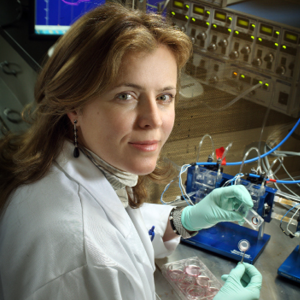2019 research awards
We are excited to share with you the eight grants and three fellowships selected for funding in 2019. See below.

2019 Dr. Vincent H. Gattone Research Award
Takamitsu Saigusa, M.D.
University of Alabama at Birmingham
Project Summary
Kidney specific drug delivery using nanoparticles in Pkd1 mice
There is no cure for polycystic kidney disease (PKD), and once kidney damage starts to occur, there is a universal decline in kidney function leading to end stage kidney disease. There are drugs that slows the disease in animal models of PKD but failed to show efficacy in clinical trial such as mTOR inhibitor. One explanation is due to systemic side effects, such as gastrointestinal intolerance, that resulted in non-adherence leading to ineffective treatment. One solution to circumvent the systemic adverse effects is the development of kidney specific drug delivery. This reduces the chance of the drug being taken up by the liver, which is the major source of drug metabolism. The overall goal of this proposal is to utilize kidney targeted nanoparticles to deliver drugs, specifically in mouse models of PKD.
Biography
Dr. Saigusa earned his medical degree from the National Defense Medical College in Japan and completed his clinical training in Internal Medicine and Nephrology in both Japan and in the US. During his Nephrology fellowship training at the Medical University of South Carolina, he began his research in primary cilia and PKD under the mentorship of Dr. P. Darwin Bell. His contribution to the field of PKD research includes studying how loss of cilia or polycystin1 activates the intrarenal renin-angiotensin system that promotes cystogenesis in PKD mice, funded by the NIH/NIDDK K08 award. Dr. Saigusa is currently a physician-scientist at the University of Alabama at Birmingham who sees patients with kidney disease and conducts laboratory research. His current research interest is to determine whether factors that increases kidney size, such as high protein diet, accelerates cyst growth through activating the immune cells in PKD mice.

2019 Young Investigator Award
Sorin Fedeles, Ph.D.
Yale School of Medicine
Project Summary
Controlling the viability of PKD mutant cells via inactivation of XBP1 as a novel strategy to treat ADPKD
Polycystic kidney and liver diseases belong to a family of genetic fibrocystic disorders that primarily affect the kidney and liver. The current proposal focuses on a pathway i.e. Ire1α-XBP1 that we have recently implicated in the pathogenesis of ADPKD and that we have found, to our surprise, to play an important role in controlling the viability of Pkd1 deficient cells. Genetic inhibition of this pathway in relevant mouse models of ADPKD led to a slowing down of disease progression and significantly improved kidney function. Avenues that can inhibit Ire1α-XBP1 may thus hold clear therapeutic potential for the treatment of ADPKD and potentially, ARPKD.
Biography
Sorin Fedeles has an extensive background in academic basic research with a focus on genetic kidney diseases. Through his research he has contributed to the understanding of the genetic and molecular mechanisms of Autosomal Dominant Polycystic Kidney and Liver Disease (ADPKD/ADPLD). He obtained his PhD in Genetics at Yale and after his postdoc continued at Yale as a research faculty. During the last few years, he spearheaded a collaboration with a bio-engineering group at MIT to develop a novel class of drugs for the treatment of ADPKD which has recently secured patent protection through the combined efforts of Yale’s and MIT’s technology licensing teams. Sorin is passionate about scientific innovation and the process required to advance discoveries along the science-business continuum. In order to develop his business knowledge, he pursued an MBA at Yale SOM (class of 2016) and complemented it with a Blavatnik Fellowship in Life Science Entrepreneurship where emerging science and business leaders identify breakthrough innovations emerging from Yale in order to foster their commercialization.

Liudmila Cebotaru, J.D. M.D.
Johns Hopkins University
Project Summary
Small molecule correctors reduce cyst growth in ADPKD
Adult autosomal dominant polycystic kidney disease is characterized by the progressive enlargement of multiple renal cysts, leading to the failure of the kidney to function in 50% of patients. There are currently limited therapies that can alter the progression to renal failure. We provide compelling preliminary data demonstrating that VX-809, a drug in clinical use to treat patients with cystic fibrosis (CF), can reduce cyst growth and improve renal function in an aggressive mouse model of ADPKD. VX-809 reduces cysts via a novel mechanism, and we propose that VX-809 promotes the absorption of fluid from inside the cyst and, at the same time, robs the cysts of their ability to grow. Our objective is to provide proof-of-principle, based upon its mechanism of action, that VX-809 can be used to treat patients with ADPKD.
Biography
Dr. Liudmila Cebotaru’ s training in medicine began at the age of 18, when she received a R.N. degree from Medical College of Balti, Moldova. She continued her medical training by obtaining an M.D. degree from “Carol Davila” University of Medicine and Pharmacy of Bucharest, Romania, and then obtained further training in the areas of pathology. While studying medicine, she also successfully achieved a J.D. degree from the University of Bucharest, Law School and continued in the US, where she later received a Master’s Degree in US Law from the University of Baltimore. Her training in the U.S. began as a post-doctoral fellow at Johns Hopkins University in Gastroenterology and Physiology. She remained at JHU and was promoted to Associate Professor in 2017. In keeping with her training in both medicine and basic science, her passion is to understand the molecular basis of the disease process and to restore normal function to disease-causing mutant proteins. She strongly believes that by understanding the mechanism of the disease process at a basic level, we can devise strategies to correct or at least, bypass defective proteins and restore function. She is currently conducting extensive studies in developing gene therapies for Cystic Fibrosis and in the role of CFTR in PKD. As a result of her past studies on the mechanism of how the cell handles defective proteins and how to rescue function using inhibitors, small molecule potentiators and correctors, she uncovered a new strategy for reducing cyst growth in ADPKD.


Timothy Fields, M.D. Ph.D. and Katherine Swenson-Fields, Ph.D.
University of Kansas Medical Center
Project Summary
Pre-clinical evaluation of Caspase 1 as a therapeutic target in ADPKD
The only drug approved for treatment of ADPKD is tolvaptan, which has side effects that can limit its use. Our goal is to identify new therapies for ADPKD to complement tolvaptan. Our studies have implicated a cellular protein complex called the inflammasome in PKD progression. To test whether the inflammasome can influence PKD, we engineered a mouse model of ADPKD in which the key component of the inflammasome, Caspase 1, is genetically deleted. Remarkably, deletion of Caspase 1 significantly slowed disease progression. We propose to examine the mechanism by which Caspase 1 affects disease. We will also test an inhibitor of Caspase 1, alone and in combination with tolvaptan, in an ADPKD mouse model. This drug, VX-765, has been shown to be well tolerated in human clinical trials for epilepsy, so success in these aims could facilitate rapid advancement to clinical trials for PKD.
Biography
Dr. Timothy Fields earned his B.A. in Biology from the University of Chicago in 1987 and subsequently obtained his MD and PhD degrees from Duke University. After post-graduate and pathology residency training at Duke University, he served on faculty there until 2008, when he moved to the University of Kansas. He is currently a nephropathologist and Professor in the Department of Pathology & Laboratory Medicine at Kansas. He shares a research laboratory in the Jared Grantham Kidney Institute with Dr. Katherine Swenson-Fields, where their work focuses primarily on immune regulation of disease progression in PKD.
Dr. Katherine Swenson-Fields earned her B.S. in Microbiology, as well as her PhD, from the University of Washington in Seattle. She did post-doctoral training at Harvard Medical School, where she also served as Instructor. She subsequently moved to Duke University, where she served on the faculty in Cell Biology until 2008, when she moved to the University of Kansas. She is currently Research Associate Professor in the Department of Anatomy & Cell Biology at Kansas. She shares a research laboratory in the Jared Grantham Kidney Institute with Dr. Timothy Fields, where their work focuses primarily on immune regulation of disease progression in PKD.

Feng Qian, Ph.D.
University of Maryland School of Medicine
Project Summary
Polycystin-1 Cleavage Product P100: Distinctive Topology, Specific Properties, and Polycystin-2-Associated Channel Activity
This proposal will investigate the little understood product of Polycystin-1 (PC1) processing, P100, which we previously discovered to be generated from intact PC1 protein. We have found that P100 is produced much more in cystic kidneys compared to normal kidneys. We suspect that P100 may play a special role in a healthy kidney and its dysregulation may promote the disease progression. Our idea is that P100 may have distinctive features and form a special ion channel complex with PC2. This project will use a multi-disciplinary approach to examine whether P100 has this function and whether ADPKD mutations affect it. By doing so, we will gain critical information about the new component of PC1 protein complex and its function that is important for ADPKD. Accordingly, the present study has the potential for developing new therapeutic strategies targeting the primary defects of ADPKD, and will greatly transform our understanding of the disease.
Biography
Dr. Qian graduated in Biology at the University of Freiburg, Germany. He received his Ph.D. (Dr. rer. nat.) from the Universities of Heidelberg and Freiburg, Germany under the supervision of Professor Dr. Albrecht Sippel, working on genomic organization, splice products and chromosomal localization of the gene family of transcription factor Nuclear Factor One. He did his postdoctoral fellowship in the laboratory of Gregory Germino, M.D. at Johns Hopkins to study polycystic kidney disease, where he discovered molecular interaction between polycystin-1 and -2, and the “two-hit” mechanism of cystogenesis in human ADPKD. Dr. Qian joined the Johns Hopkins University School of Medicine as an Assistant Professor, and moved to University of Maryland School of Medicine as an Associate Professor in 2012. He uses molecular, cellular and animal models to study the function of proteins encoded by genes whose mutations cause human polycystic kidney disease, and to establish a firm mechanistic understanding of the disease process. His laboratory has discovered cis-autoproteolytic cleavage of polycystin-1 at the juxtamembrane GPCR proteolysis site (GPS) motif and established this post-translational modification as a key mechanism that controls biogenesis, ciliary trafficking and biology function of the protein.

Ian Smyth, Ph.D.
Monash University, Australia
Project Summary
Investigating a new regulator of cyst development in PKD
Mutations in the genes which cause polycystic kidney disease trigger significant changes in signaling within the cells of the kidney tubules. These alterations likely elicit the shifts in cellular behavior which result in increased cell proliferation and cyst formation. We have identified a gene which is overexpressed in PKD and which – when simultaneously removed in animal models of disease – can almost completely prevent the formation of cysts. In this application we seek to understand how this is achieved, whether it might be employed as a mechanism to prevent the formation and/or progression of cystic disease and to understand how this gene functions in kidney epithelial cells. By advancing our knowledge in this manner we hope to identify opportunities to explore for the development of new PKD therapies.
Biography
Professor Ian Smyth is an NH&MRC Senior Research Fellow at Monash University in Melbourne, Australia. He co-heads the Development and Stem Cells Program at the Monash Biomedicine Institute and is the Deputy Head (Research) of the Department of Anatomy and Developmental Biology. His doctoral studies at the University of Queensland focused on understanding the role of the PATCHED genes in human disease. He then undertook postdoctoral work in Edinburgh, Houston and London using forward genetic screens in mice to identify novel genes involved in skin and kidney development and disease. His group’s work focuses on two specific questions: how development of the fetal renal collecting duct system is impacted by genetic mutation and environmental perturbation and how disruption of signaling in these cells in the adult kidney gives rise to cysts in ciliopathy patients.

Terry Watnick, M.D.
University of Maryland Medical Center
Project Summary
BAC transgenesis to model an aneurysm-associated human mutation in mice
ADPKD is a common form of inherited kidney failure that is associated with a 5-10X increased risk of intracranial aneurysms (ICA, dilatations of blood vessels). This is an important problem because aneurysm rupture can result in significant disability and/or premature death. The risk of ICA clusters in certain ADPKD families suggesting that genetics play an important role. Despite the high percentage of ADPKD families (~25%) reporting a history of ICA, there have been no comprehensive studies of the genetic factors that predispose patients to this complication. Our proposal seeks to address this unmet need by modeling an aneurysm-associated human PKD1 mutation in mice and studying its effects in blood vessels. We expect that a better understanding of how PKD gene mutations result in aneurysms will allow us to develop improved strategies for identifying those patients at highest risk for this potentially catastrophic complication.
Biography
Dr. Terry Watnick is Professor of Medicine in the Division of Nephrology at the University of Maryland School of Medicine in Baltimore. She received her medical degree from The Yale School of Medicine and completed her Internal Medicine training at Yale-New Haven Hospital. She then moved to the Johns Hopkins Hospital where she received Clinical Training in Nephrology. She also completed a research fellowship at Johns Hopkins that was focused on the genetics of autosomal dominant polycystic kidney disease. Dr. Watnick directs an inherited renal disease clinic at the University of Maryland. She has been an investigator in several multicenter Clinical Trials recruiting patients with ADPKD, including TEMPO, REPRISE and TAME. She is the Principal Investigator for NIH funded Baltimore Polycystic Kidney Disease Research and Clinical Core Center.

Jing Zhou, M.D. Ph.D.
Brigham and Women’s Hospital
Project Summary
Elucidating the cystogenic proteome in polycystic kidney disease
ADPKD is characterized by the development of bilateral enlarged epithelial-lined cysts in the kidney, which ultimately leads to renal failure in half of the patients. A number of signaling pathways has been found to be dysregulated in ADPKD. However, how polycystin-1, the product of the ADPKD gene mutated in 85% of patients, modulates these pathways remains elusive. This research will utilize a new global technology to identify the proteins changed in the early stage of cyst formation and linked signaling networks. The work shall provide novel insights into the mechanisms of the disease by using multidisciplinary approaches including biochemistry, bioinformatics, cell biology, genetics, and animal models of the disease. This research will likely identify new drug targets and promote the development of new therapies for polycystic kidney disease.
Biography
Dr. Zhou has a broad background in kidney pathobiology and molecular genetics, with specific training and expertise in inherited kidney diseases. Research in her lab, starting in 1993 at Brigham and Women’s Hospital, Harvard Medical School, centers on the understanding of disease mechanisms for inherited kidney diseases, particularly Alport syndrome and autosomal dominant polycystic kidney disease. For the past 20 years, Dr. Zhou’s lab has made multiple significant contributions to the understanding of polycystin functions and disease mechanisms using multidisciplinary approaches including molecular genetics, molecular and cellular biology, physiology and pathophysiology. As PI of several NIH-funded grants, she laid the groundwork for the proposed research by developing animal models including the first knockout mouse model for polycystic kidney disease and using these models to understand the pathogenesis of the disease.
2019 fellows

Harini Ramalingam, Ph.D.
University of Texas Southwestern Medical Center
Project Summary
Investigating the m6A RNA Methylation Pathway as a Therapeutic Option for ADPKD Treatment
ADPKD is a genetic disease characterized by the growth of numerous fluid-filled cysts in the kidney. Currently, ADPKD is a leading cause of kidney failure. The goal of my project is to find therapeutic targets that can treat ADPKD. We have identified that a novel biochemical pathway called m6A RNA methylation, is elevated in human ADPKD and multiple mouse models of ADPKD. Through genetic modulation of this pathway, we are able to reduce disease progression in one ADPKD mouse model. Next, my aim is to determine whether this pathway is a common mode of disease pathogenesis in clinically-relevant ADPKD models. Recent evidence shows that m6A RNA methylation affects the abundance of proteins. I will employ a cutting-edge technology called Ribo-seq and bio-informatic tools to identify all the actively processed proteins, which are regulated by this RNA modification pathway and are key players of ADPKD progression.
Biography
I received a Bachelor’s degree in Computer Science and a Master’s in Biological Sciences from Birla Institute of Technology and Science, India in 2009. I received my doctoral degree from the University of Texas Southwestern Medical Center in 2017. I finished my dissertation studies under the tutelage of Dr. Thomas Carroll. My dissertation title was “Balancing Renewal and Differentiation of Progenitor Cells in the Developing Kidney”. I joined Dr. Vishal Patel’s lab in 2018 for postdoctoral research training. My research is focused on understanding RNA metabolism in ADPKD progression and kidney development.

Venkata Vivek Reddy Palicharla, Ph.D.
University of Texas Southwestern Medical Center
Project Summary
Role of Tulp3-mediated ciliary protein trafficking in kidney cystogenesis
PKD is characterized by the presence of multiple large cysts in kidneys. These cysts result in an abnormal increase in the size of the kidneys, ultimately leading to kidney failure. Only one drug is available to treat PKD. Therefore, it is important to do more research on PKD to develop better treatment strategies. The first step in this process is to understand how kidney cysts are formed. Cells in kidneys have small appendages called primary cilia which are involved in sensing the environment and regulating multiple cellular functions. Earlier research has implicated the involvement of cilia in PKD pathogenesis. Through our research, we aim to understand how protein transport into and out of the cilia regulates cyst formation and test if any of these processes can be of therapeutic potential.
Biography
Dr. Palicharla is a post-doctoral fellow under the mentorship of Dr. Saikat Mukhopadhyay in the Department of Cell Biology, UT Southwestern Medical Center, Dallas, TX. He is currently working on understanding the role of protein trafficking to primary cilia in polycystic kidney disease. He earned his Ph.D. from Centre for DNA Fingerprinting and Diagnostics (CDFD) (Manipal Academy of Higher Education), India, where he worked on identifying novel cellular roles of non-canonical ubiquitin linkages.

Rebecca Walker, Ph.D.
University of Maryland
Project Summary
Relieving the Stress of PKD: A new role of PKHD1 in detoxification mediated via differential cleavage of the intracellular domain
ARPKD is a severe disease causing cyst-development throughout the kidneys. ARPKD is caused by mutation in the PKHD1 gene. The child mortality rate is high, therefore current treatment focuses on addressing severe symptoms in childhood. Patients surviving the first year of life have poorly functioning kidneys and often require extensive hospital treatment. Our knowledge of mechanisms underlying ARPKD cyst-development is greatly lacking. There is a real need for research to understand the fundamental properties of the proteins and mechanisms underlying ARPKD. Our lab has found a possible link between PKHD1 protein and detoxification of harmful chemicals in the kidney. We believe that PKHD1 protein is processed to produce fragments that move around inside kidney cells and activate pathways which warn the cell of toxins. Success in this investigation will transform our understanding of cyst-development in PKD and provide potential innovative targets for patient treatment.
Biography
Dr. Walker received her Bachelor of Science degree from The University of Leicester in the UK where her love for genetics flourished. She went on to receive her PhD from Oxford University in the UK, performing research which began her career in the field of Polycystic Kidney Disease, under the mentorship of Dr. Dominic Norris. She has undertaken important research discussing the significance of Polycystin 2 localization to cilia, a cellular organelle. Upon moving to the USA, she began her postdoctoral research in the Laboratory of Dr. Feng Qian and has expanded her interest to include investigating ARPKD. She has become intrigued by the mechanisms involved in maintaining a healthy tubule architecture and discovering which of these are disrupted in Polycystic Kidney Disease.
Last reviewed May 2021








